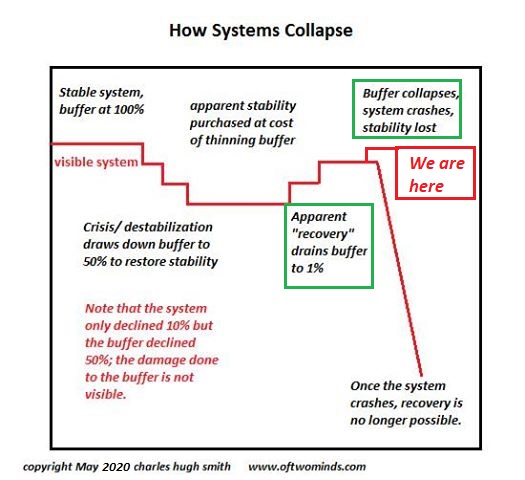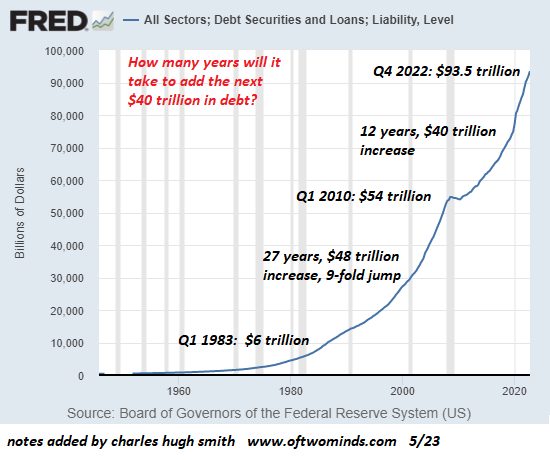What If the Fed Has Lost Control?
May 3, 2023
When this bubble bursts, there will be no fourth or fifth bubble, there will only be rubble.
The US economy and its financial system operate under the implicit belief that the Federal Reserve controls the direction of the economy and finance. This belief isn't in Fed influence, it's in Fed control: the Fed can reverse a stock market decline on a dime, it can reverse a recession, it can do "whatever it takes" to keep markets stable and expansive.
The history of the past 30 years seems to support this belief. Every time a financial crisis has manifested, the Fed has "saved the day" with some new policy extreme, changing the rules, jacking up its balance sheet 10-fold, and so on.
The flaw in this confidence in Fed control is the three speculative bubbles that have inflated and burst in the era of Fed Control, 1995 to the present. These bubbles could not have inflated without a "dovish" Fed pushing interest rates down and juicing the financial system with liquidity / credit. Since all speculative bubbles eventually burst, the Fed is forced into "rescue mode" which requires ever more extreme manipulation, oops, I mean intervention, to stabilize the bubble bursting and inflate the next bubble.
What few entertain as a possibility is the Fed is losing control of the economy and finance for systemic reasons that have nothing to do with Fed Policy per se. In other words, it's not a "Fed policy error" that brings the system down, it's much larger forces: diminishing returns and second order effects.
The immediate effect of new Fed policy extremes is strong, much like a new drug has an immediate effect. But as the drug is injected again and again, it loses its efficacy. In medicine this is a biological process; in finance, it's a psychological process as participants habituate to every new Fed policy extreme and count on its 1) permanence and 2) continued efficacy.
For example, the Fed's trick of lowering bond yields / interest rates. Participants can confidently increase their exposure to risk to insane levels and dispense with hedges because they're confident the Fed will drop interest rates back to zero if the stock market falters.
This confidence in the efficacy of Fed policies can be understood as a buffer, providing resilience and a backstop ("the Fed Put") to any financial / economic instability. Participants stop panicking the moment the Fed announces a new dovish policy, even if the policy has limited effect on real-world conditions. The decline of real-world efficacy is masked by the instant euphoria of participants, who have come to count on the Fed'a actions resolving crises literally overnight.
The decay of diminishing returns occurs under the radar. Few understand all the Fed's actions (reverse repos, etc.) or the scale of these operations, or their efficacy in terms of correcting dis-equilibrium / instabilities in the real-world economy and markets.
While participants continue to believe these buffers will always protect the system from hazard, the buffers have eroded. The next Fed "save" fails, revealing the buffers have collapsed. Put another way, the Fed has lost control.
Every new Fed policy extreme generates second order effects which unleash unintended consequences.
The prime example is moral hazard, the belief that risk can be taken on to boost speculative gains without suffering any consequences of that risk blowing up.
Since participants believe the Fed will slash interest rates back to zero as soon as markets swoon, they increase their gambles based on that confidence. Any debt taken on today can be rolled over into lower rates in the future, so there's no limit on risk or credit expansion. The riskiest possible expansions of credit--to fund stock buybacks, acquisitions of competitors, etc.--are greenlighted based on the confidence that the Fed will always push interest rates back toward zero as soon as conditions wobble.
This confidence sets up a feedback loop in which Fed policies push participants to extremes of risk and debt that guarantee speculative bubbles inflate and then burst, demanding fresh Fed policy extremes. In other words, the Fed has created a doom-loop in which the most insane risk is transformed into a "safe bet" based on the expectation of a Fed "save."
But what if the Fed is unable to push policies to new extremes due to systemic constraints? What if policies that worked like magic before no longer work this time around due to diminishing returns / collapse of buffers?
What if the Fed cannot reverse the doom-loop of second order effects its previous policy extremes have generated?
These outcomes don't seem farfetched to anyone who studies systems dynamics. Rather, they seem inevitable and predictable.
What if the Fed has already lost control but nobody dares question the confidence in Fed omnipotence? It's not the Fed policy extremes that work the magic, after all; it's the confidence of participants that resolves the bubble bursting crisis.
Those who look at systems dynamics have solid reasons for seeing this third massive Everything Bubble as the last bubble. When this bubble bursts, there will be no fourth or fifth bubble, there will only be rubble.


New Podcast:
Its a Waterfall - Risk, Collateral & Productivity (48 min)
 My new book is now available at a 10% discount ($8.95 ebook, $18 print):
Self-Reliance in the 21st Century.
My new book is now available at a 10% discount ($8.95 ebook, $18 print):
Self-Reliance in the 21st Century.
Read the first chapter for free (PDF)
Read excerpts of all three chapters
Podcast with Richard Bonugli: Self Reliance in the 21st Century (43 min)
My recent books:
The Asian Heroine Who Seduced Me
(Novel) print $10.95,
Kindle $6.95
Read an excerpt for free (PDF)
When You Can't Go On: Burnout, Reckoning and Renewal
$18 print, $8.95 Kindle ebook;
audiobook
Read the first section for free (PDF)
Global Crisis, National Renewal: A (Revolutionary) Grand Strategy for the United States
(Kindle $9.95, print $24, audiobook)
Read Chapter One for free (PDF).
A Hacker's Teleology: Sharing the Wealth of Our Shrinking Planet
(Kindle $8.95, print $20,
audiobook $17.46)
Read the first section for free (PDF).
Will You Be Richer or Poorer?: Profit, Power, and AI in a Traumatized World
(Kindle $5, print $10, audiobook)
Read the first section for free (PDF).
The Adventures of the Consulting Philosopher: The Disappearance of Drake (Novel)
$4.95 Kindle, $10.95 print);
read the first chapters
for free (PDF)
Money and Work Unchained $6.95 Kindle, $15 print)
Read the first section for free
Become
a $1/month patron of my work via patreon.com.
NOTE: Contributions/subscriptions are acknowledged in the order received. Your name and email remain confidential and will not be given to any other individual, company or agency.
|
Thank you, Swedekev ($15), for your most generous contribution to this site -- I am greatly honored by your support and readership. |
Thank you, Mark S. ($10/month), for your outrageously generous pledge to this site -- I am greatly honored by your steadfast support and readership. |
|
Thank you, William M. ($5/month), for your monumentally generous pledge to this site -- I am greatly honored by your support and readership. |
Thank you, James W. ($100), for your outrageously generous contribution to this site -- I am greatly honored by your steadfast support and readership. |

|